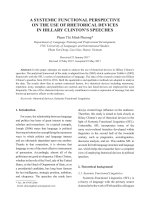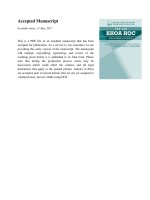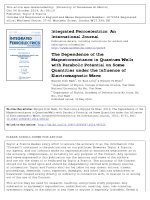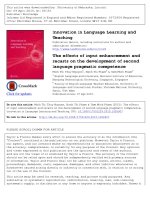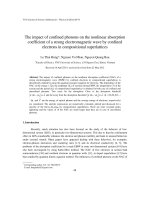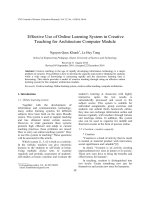DSpace at VNU: The impact of corruption on FDI inflows to Vietnam for the period 2004 to 2010
Bạn đang xem bản rút gọn của tài liệu. Xem và tải ngay bản đầy đủ của tài liệu tại đây (73.2 KB, 2 trang )
The impact of corruption on FDI inflows to
Vietnam for the period 2004 to 2010
Students: Le Thi Hai Yen, Chu Thi Nhuong
Class: QH-2008-E Finance Banking
Supervisor: Dr. Vu Quoc Huy
Prize: Third Prize at UEB level, 2011
Main content:
Corruption is a complex phenomenon affecting many aspects of the economy. There are
two streams of different views on the impact of corruption on the economy: the first one
for that corruption impacts negatively on economic growth, education, quality of
infrastructure and public investment, but the views opponents say the positive impact of
corruption on businesses as it helps businesses more profitable to spend only a small fee
to get the information and important privilege. Corruption in Vietnam is becoming more
severe as the survey and then to 80% of firms complaining about the cost of lubrication
and that corruption is a serious obstacle. Starting from the conflicting views on corruption
and the corruption in Vietnam, the paper wants to focus on clarifying "The impact of
corruption on FDI inflows to Vietnam and measure the impact of FDI to corruption:
when the corruption increased a point, how much does it lead to FDI increasing? ". To
answer this question, all studies use econometric models with the variables as factors
affecting FDI: Corruption, gross domestic production and exchange rate. The results that
the group got was "corruption goes along with FDI and when corruption increases a
point, FDI will increase 18.0166%." To explain this paradox, the group offers two
explanations: (1) now, the investors are attracted by tax incentives and cheap labor, so the
effects of corruption is fuzzy; even it has a positive impact, (2) business relationship in
Vietnam bases on the relationship, “the second most used body” so that those businesses
that have relationships with other officials and agencies employees will gain more
favor. But the paper's model has some limitations: the number of observations is in a
short time and have not reflected the many changes of variables, corruption perceptions
index of Transparency at the World changes in the period from 2004 to 2010 and finally
because of the lack of data, we used averaging method to get data corruption and labor of
the quarter. The main factors could cause the model not be able to achieve the best
results. To restrictions on the time, group will improve sets of data and further develop
themes: forecasting the impact of corruption in terms of preferential policies that are no
longer effective.

